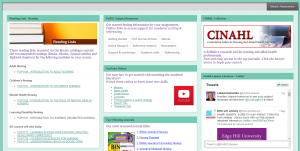Revising for exams can be a very stressful time. There are a number of things that can help, like a structured timetable, with plenty of breaks built in. However, once you have identified your timescales and developed a map of how you are breaking down your revision, one of the first things you will need to do is ensure that you fill any gaps in your knowledge. Have a read through of your lecture notes and check past papers, if available. From the types of questions that come up time and again, you can evaluate if you need to supplement your knowledge in any key areas.
This is where the library, and your Subject Librarian in particular can help you. You will need access to a wide range of resources, including books, journal articles and websites. You will also need to construct a good search strategy, to ensure you get to the right information quickly. The Library catalogue is a good start point for books – both on the shelf and electronic. If you have a tablet or e-reader, you can directly download the content and print off specific chapters. Click here to access our catalogue and start looking for books.
Journals are a great source of useful information. They are usually short papers that cover an aspect of your topic in great detail. They are published regularly, so you can quickly get to the latest thinking in your field. Most of our journals are available online and are searchable in databases, so this makes them even more convenient for you. A great start point is our Discovermore, our search engine that searches across a range of our smaller databases. You can filter your results by year, subject and type of item, so you can usually get to what you need quickly.
You might need to access some of the specific subject databases that the library offers, but if you’re not sure, you can always ask someone at the Ask Desk in the library for more advice, or check your Resources tab on Blackboard for some subject specific suggestions (and a handy link!) This tab also has some great links to the Library Subject pages, where you will find advice on using websites for research and a list of good ones in your subject area. There is a wealth of information just waiting to be discovered here.
Practice active reading – keep your exam questions in mind and think about how what you are reading relates to what you already know – give your material a read through once before making any notes – that way you won’t be tempted to write all down. Try to make your notes colourful with spider diagrams and bullet points, which will make it easier to remember the main points later. I am a big fan of the 80s style four colour pen…
But above all, stay hydrated, take lots of breaks and don’t be tempted by the new Game of Thrones season. Good luck everyone!



